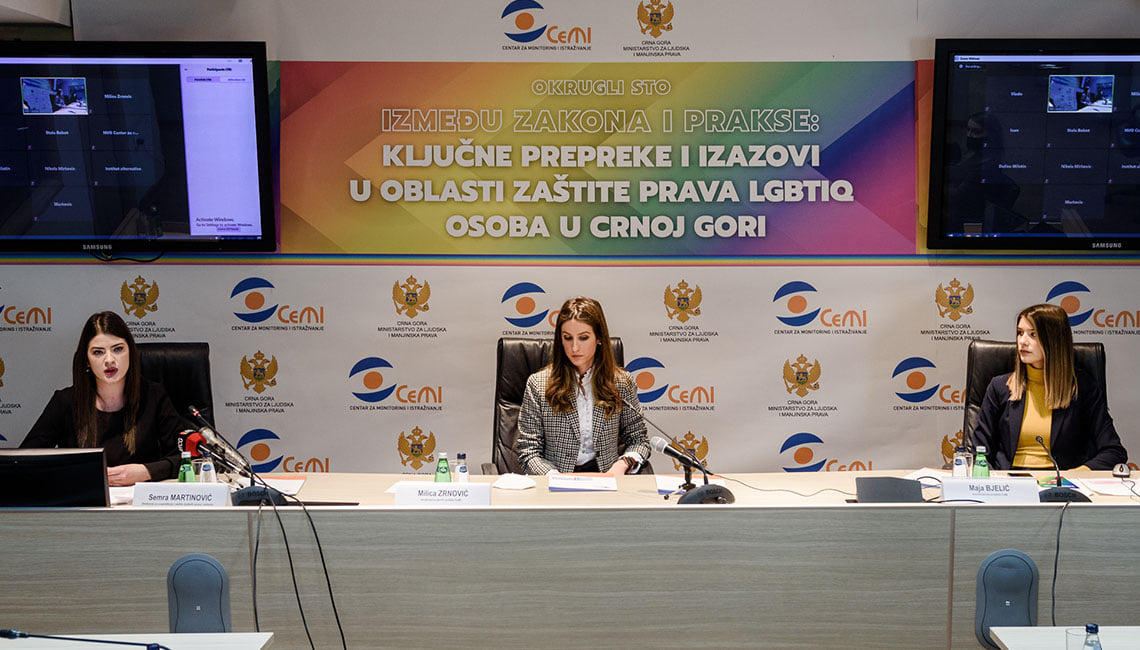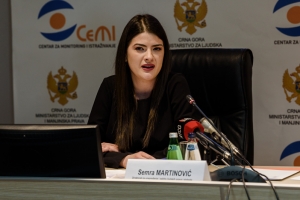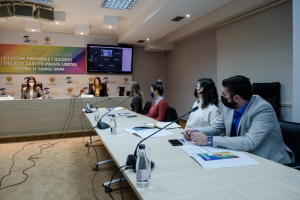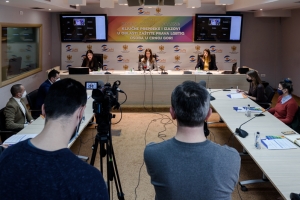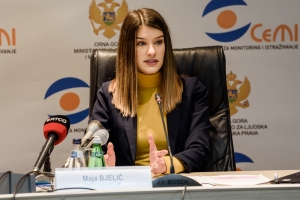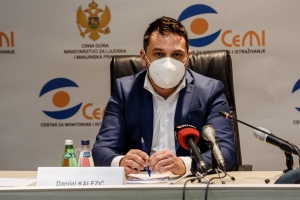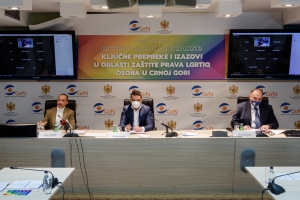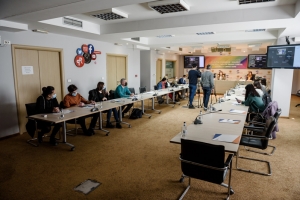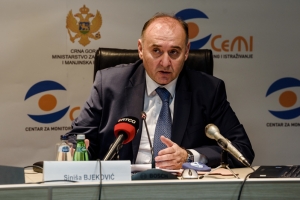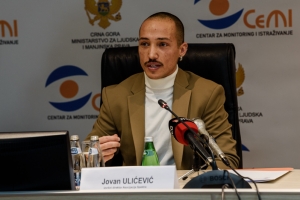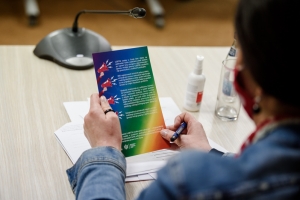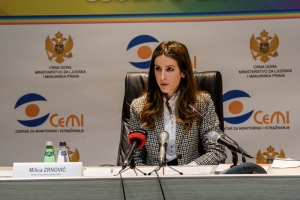In Montenegro, judicial practice is not standardized when it comes to dealing with cases related to violence against LGBTIQ persons, and most crimes against this community are prosecuted in misdemeanor proceedings, rarely in criminal ones.
This was announced at the round table "Between law and practice: key obstacles and challenges in the field of protecting the rights of LGBTIQ persons in Montenegro", organized by the Center for Monitoring and Research (CeMI), within the project "Equality of LGBTIQ persons before the law - Improving the rights of LGBTIQ persons in court proceedings".
CeMI public policy researcher Milica Zrnovic said that despite the progress achieved when it comes to the position of LGBT persons before the law, there are certain issues that cause concern.
"Namely, research conducted by the Center for Monitoring and Research as part of this project indicates that the majority of crimes against LGBTIQ persons are prosecuted in misdemeanor proceedings, while they are rarely prosecuted as criminal proceedings, and most often by applying the Law on Public Order and Peace, not the Law on the prohibition of discrimination", stated Zrnovic.
According to her, the analysis showed that there is evident public incitement to hatred, intolerance and bigotry, as well as insufficient measures of judicial protection and sanctions, which is still a current issue of Montenegrin society.
"What causes this concern, above all, is hate speech, which is one of the main problems faced by members of the LGBTIQ community, both in Montenegro and in the region, as evidenced by numerous criminal charges and misdemeanor proceedings," Zrnovic said.
The representative of the Directorate for the Promotion and Protection of Human Rights and Freedoms in the Ministry of Justice, Human and Minority Rights, Semra Martinovic, assessed that the project implemented by CeMI was recognized as a quality contribution to the implementation of the Government's policy in the area of improving the quality of life of LGBT people in Montenegro.
"Montenegro has set the basic normative framework for protection against discrimination and violence against the LGBT population in a high-quality manner and in accordance with international standards." In the area of misdemeanor legal protection, I would emphasize the Law on Prohibition of Discrimination, which prohibits discrimination on the basis of sexual orientation and gender identity and intersex characteristics," said Martinovic.
According to that law, as she added, hate speech based on the personal characteristics of any individual is prohibited.
The Head of the Governing Board of the organization Queer Montenegro, Danijel Kalezic, said that most cases of violence against the LGBTIQ community do not end up before the judicial authorities, "they don't even reach the police."
"There are several reasons for that." First, most incidents motivated by homophobia or transphobia occur and most acts are committed against non-auto people. Bullies usually choose as victims those who are not encouraged enough to report the violence that happened to them. On the other hand, we are also seeing an increase in domestic violence," Kalezic pointed out.
He assessed that the legislation is rapidly changing, but that its application is not following it at the same speed, as are social changes in the acceptance of LGBT persons.
"This means that we need to slow down with legislative reform and that we need to make significantly greater efforts to strengthen the implementation of all those laws in an adequate manner and to make significant efforts to ensure that the judicial practice is such that it balances out all that we have on paper," Kalezic pointed out.
He believes that one of the main problems in Montenegro is that judicial practice is not standardized, stating that this is somewhat understandable considering that not all judges have received training and that not all of them are sufficiently sensitized.
Kalezic said that there was only one verdict passed for a hate crime as an aggravating circumstance, which the higher court sent back for re-decision.
He cited the example of Croatia, which introduced hate crime as an aggravating circumstance into the criminal legislation long before Montenegro, which resulted in a significant decrease in attacks against LGBTIQ persons.
Kalezic assessed that deterrent punishments for perpetrators are necessary, as well as that they need to be standardized.
The CEO of the Spektra Association, Jovan Ulicevic, said that practice shows that the legislative framework, although improved, often does not mean much.
"When we talk about the Law on the Prohibition of Discrimination, we also have a ban on discrimination based on sexual orientation, gender identity and intersexual characteristics. The issue of intersex persons in Montenegro is not open at all. The issues of transgender people are practically open," Ulicevic stated.
He said that the LGBTI community is treated as one homogenous entity, without recognizing the specifics that certain communities within the LGBTI community face.
Ulicevic pointed out that trans people are still the only group in Montenegro that must undergo sterilization in order to receive personal documents that correspond to their gender identity.
"As someone who is trans and has gone through the whole gender reassignment process, including genital surgery, I only realized afterwards how traumatic it is when you realize you had no choice. You had no choice to say I want to do this with my body, or I don't want to, because you had to make life easier for yourself to get personal documents that match your identity, your description," Ulicevic said.
The Protector of Human Rights and Freedoms of Montenegro, Sinisa Bjekovic stated that the misdemeanor courts in their practice had cases that concerned the injured parties, which had the characteristic of different orientations.
"All the data from 2018 and 2019 show that the misdemeanor courts handled about sixty cases per year, which was a clear signal that it is necessary to channel the provisions of these laws when we have harsher sanctions in certain areas," said Bjekovic.
He assessed that court proceedings in practice turn into the condemnation of the victim, and not the protection of the victim.
"That's what we have to work on and understand that we have to create our own awareness of recognizing the vulnerability of other groups, just as we recognize our own vulnerability when we are not equal," said Bjekovic.
Maja Bjelic, the project coordinator at CeMI, said that the project "Equality of LGBTIQ persons before the law - Improvement of the rights of LGBTIQ persons in court proceedings" aims to contribute to the equality of LGBTIQ persons before the law and the improvement of their rights in court proceedings.
"We strive to contribute to increasing the level of respect for the human rights of members of the LGBTIQ community in Montenegro, reduce the level of discrimination, increase public awareness and information about the sensitive treatment of LGBTIQ people in Montenegro in court proceedings," said Bjelic.
The project, as she said, is aimed at strengthening the capacity and greater training of judicial instances in the prosecution of criminal offenses against the LGBTIQ population, as well as the treatment of LGBTIQ persons in the proceedings in an equal and adequate manner.
The round was held as part of the project "Equality of LGBTIQ persons before the law - Improving the rights of LGBTIQ persons in court proceedings", which is implemented by the Center for Monitoring and Research (CeMI), and is financed by the Ministry of Human and Minority Rights of Montenegro.
